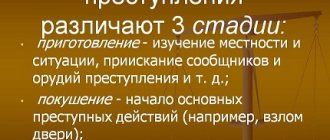ST 205 of the Criminal Code of the Russian Federation.
1. Committing an explosion, arson or other actions that frighten the population and create a danger of death, causing significant property damage or other grave consequences, in order to destabilize the activities of authorities or international organizations or influence their decision-making, as well as the threat of committing these actions for the purpose of influencing decision-making by authorities or international organizations -
shall be punished by imprisonment for a term of ten to fifteen years.
2. The same acts:
a) committed by a group of persons by prior conspiracy or by an organized group;
b) resulting in the death of a person through negligence;
c) resulting in the infliction of significant property damage or the onset of other grave consequences, -
shall be punishable by imprisonment for a term of twelve to twenty years with restriction of freedom for a term of one to two years.
3. Acts provided for in parts one or two of this article, if they:
a) are associated with an encroachment on facilities using atomic energy or with the use of nuclear materials, radioactive substances or sources of radioactive radiation or poisonous, poisonous, toxic, dangerous chemical or biological substances;
b) entailed the intentional infliction of death on a person, -
shall be punishable by imprisonment for a term of fifteen to twenty years with restriction of freedom for a term of one to two years or life imprisonment.
Note. A person who participated in the preparation of a terrorist act is exempt from criminal liability if he, by timely warning the authorities or in another way, contributed to the prevention of the terrorist act and if the actions of this person do not contain another crime.
Commentary to Art. 205 Criminal Code
1. The objective side is characterized by alternatively provided actions. Their first group includes explosion, arson and other actions (cascades, landslides; distribution of toxic substances; damage to transport communications, etc.) that frighten the population and create the danger of death, causing significant property damage or other serious consequences ( radioactive, chemical or bacteriological contamination of the area, disabling life support systems, blocking transport communications, etc.). In this variety, a terrorist act is classified as a real danger and is recognized as a completed crime from the moment the listed actions are committed, regardless of whether the socially dangerous consequences, the threat of which was created, actually occurred.
2. The second group of alternatively provided actions is formed by the threat of committing actions included in the first group. Such a threat can be expressed in any form (orally, in writing, via means of communication; both anonymously and with an indication of the author) and must necessarily be of a subjectively real nature, i.e. cause the addressee reasonable fear of its implementation. Whether the threat was objectively real (i.e., whether the person making the threat took specific actions aimed at preparing for the implementation of the threat, and whether he intended to carry out the threat at all) has no criminal legal significance. In this variety, the composition is formal.
3. The subjective side is also characterized by the goal: to influence decision-making by authorities or international organizations or to destabilize their activities.
4. Parts 2 and 3 contain qualified and especially qualified elements of the crime. At the same time, a terrorist act qualified under paragraph “a” of Part 3 also requires qualification in conjunction with Art. 220 - 221 CC; on the contrary, a terrorist act that entailed the intentional infliction of death on one or more persons is qualified only under paragraph “b” of Part 3.
5. A circumstance excluding criminal liability for this crime is a voluntary refusal to commit a crime, the specifics of which, in relation to a terrorist act, are formulated in the footnote to the article.
Terrorist act
1. Committing an explosion, arson or other actions that frighten the population and create a danger of death, causing significant property damage or other grave consequences, in order to destabilize the activities of authorities or international organizations or influence their decision-making, as well as the threat of committing these actions for the same purposes -
punishable by imprisonment for a term of ten to fifteen years.
2. The same acts:
- a) committed by a group of persons by prior conspiracy or by an organized group;
- b) resulting in the death of a person through negligence;
- c) resulting in the infliction of significant property damage or the onset of other grave consequences, -
shall be punishable by imprisonment for a term of twelve to twenty years with restriction of freedom for a term of one to two years.
3. Acts provided for in parts one or two of this article, if they:
- a) are associated with an encroachment on facilities using atomic energy or with the use of nuclear materials, radioactive substances or sources of radioactive radiation or poisonous, poisonous, toxic, dangerous chemical or biological substances;
- b) entailed the intentional infliction of death on a person, -
shall be punishable by imprisonment for a term of fifteen to twenty years with restriction of freedom for a term of one to two years or life imprisonment.
Note.
A person who participated in the preparation of a terrorist act is exempt from criminal liability if he, by timely warning the authorities or in another way, contributed to the prevention of the terrorist act and if the actions of this person do not contain another crime.
Second commentary to Art. 205 of the Criminal Code of the Russian Federation
1. The objective side is characterized by the following alternative actions:
a) committing an explosion, arson or other actions that frighten the population and create a danger of death, causing significant property damage or other socially dangerous consequences;
b) the threat of committing the specified actions.
Other actions should be understood as actions that can cause consequences similar to an explosion and arson (for example, mass poisoning, the spread of epidemics and epizootics, blocking transport communications, disabling life support facilities, etc.).
The threat of committing these actions is understood as a direct statement to commit a terrorist act, supported by the commission of actions indicating the reality of such an intention. The threat must cause the addressee reasonable fear of its implementation.
2. A terrorist act is carried out in a place where people are located or valuable property is stored, or this act is initially aimed at destroying any significant building or structure.
The act must frighten the population, create a danger of death, causing significant property damage or other serious consequences.
The danger of death of a person, causing significant property damage or other serious consequences must be real, which is determined in each specific case taking into account the place, time, weapons, means, method of committing the crime and other circumstances (data on the number of people who were in the area of the explosion, about the power and lethality of the explosive device used, etc.).
Causing significant property damage as a result of a terrorist act is qualified under paragraph “c” of Part 2 of Art. 205 and additional qualifications under Art. 167 of the Criminal Code does not require it.
Other socially dangerous consequences must be comparable in severity to the risk of human death or causing significant property damage.
3. In the event of a real occurrence of socially dangerous consequences, the act will be qualified under paragraph “b” or “c” of Part 2 of Art. 205 or under paragraph “b” of Part 3 of Art. 205 respectively.
4. The subjective side is characterized by direct intent and a special purpose - destabilizing the activities of government bodies or international organizations or influencing decision-making by government bodies or international organizations.
The threat of committing the actions listed in Part 1 of Art. 205, entails criminal liability only if committed with the aim of influencing decision-making by authorities or international organizations.
5. The subject of the crime is a person who has reached the age of 14 years.
6. If a terrorist act is recognized as committed by an organized group, the actions of all its members who took part in the preparation or commission of this crime, regardless of their actual role, should be qualified under the relevant part of Art. 205 without reference to Art. 33 of the Criminal Code.
The actions of participants in a terrorist community or terrorist organization who committed a terrorist act must be qualified according to the totality of crimes provided for in Art. 205 and accordingly Art. 205.4, 205.5, 208 CC.
7. Causing the death of a person through negligence during a terrorist act is qualified under paragraph “b” of Part 2 of Art. 205, intentional - entails liability under paragraph “b” of Part 3 of Art. 205, additional qualifications under Art. 105 of the Criminal Code is not required.
8. Other grave consequences in relation to paragraph “c” of Part 2 of Art. 205 may include, in particular, causing serious harm to the health of at least one person, moderate harm to the health of two or more persons, disruption of the activities of government bodies, etc.
9. Encroachment on objects using atomic energy (nuclear ships, nuclear power plants, space and aircraft, etc.) constitutes an explosion, arson and other actions aimed at putting them out of action, regardless of whether it is achieved or not, whether the container in which nuclear fuel is transported has been destroyed or not.
The use of nuclear materials, radioactive substances or sources of radioactive radiation or poisonous, poisonous, toxic, dangerous chemical or biological substances means their actual use in the process of committing a terrorist act (for example, to produce an explosion).
10. The law provides for the possibility of exemption from criminal liability for preparation for a terrorist act if two conditions are met, enshrined in the note to Art. 205.
Article and responsibility for telephone terrorism and hooliganism in the Criminal Code of the Russian Federation
June 8, 2020
Article and responsibility for telephone
terrorism and hooliganism in the Criminal Code of the Russian Federation
Telephone hooliganism is not always a criminal offense. To become a defendant in a criminal case initiated due to hooliganism during a telephone conversation, a person must at least perform a number of acts that fall under the definition of hooliganism, in accordance with their interpretation as such in the Criminal Code. What article of the Criminal Code of the Russian Federation provides for telephone hooliganism and what actions fall under it will be discussed in this article.
What is telephone hooliganism
The Criminal Code of the Russian Federation provides for article 213 for telephone hooliganism. This phenomenon has become especially widespread in recent decades. This is due to the fact that now every person has a mobile phone, sometimes more than one. The phenomenon is so widespread that there is even a term for telephone hooligans. They are called pranksters.
Most often, teenagers want to call and mock someone. However, they often do not realize that their actions are a violation of the law. To understand exactly what actions can be considered hooliganism over the phone, you need to understand what exactly the legislator means by the concept of hooliganism.
According to the above-mentioned Article 213 of the Criminal Code of the Russian Federation, actions are considered hooliganism in the following cases:
- are a gross violation of public order;
- appear as open disrespect for the existing social system and members of society;
- made using weapons of any type, or things capable of acting as such;
- the root cause of which is hatred of any kind: religious, racial, class, etc.;
- committed in a place where there is a large gathering of members of society.
From the above, it becomes clear that criminal liability for telephone hooliganism occurs extremely rarely.
The problem is that it is very difficult to prove the presence of hooligan motives described in Article 213 of the Criminal Code of the Russian Federation. At the same time, this state of affairs does not mean that those who like to have fun in this way can relax. In addition to the Criminal Code, penalties for such actions are also provided for by the Code of Administrative Offenses of the Russian Federation.
Hooliganism on the telephone from the point of view of the Code of Administrative Offenses of the Russian Federation
The Code of Administrative Offenses of the Russian Federation considers public order as the object of a crime. In particular, there are several points that allow pranksters to be held accountable.
A suitable article for telephone hooliganism is 20.1.
The following actions are considered hooliganism:
- expression of disrespect towards members of society;
- violation of the established foundations of society;
- obscene language;
- insults and harassment.
Performing all of the above actions, including during a telephone conversation, entails sanctions.
The law provides the following punishment for telephone hooliganism of this type:
- fine from 500 to 1000 rubles;
- imprisonment for up to 15 days.
As a rule, punishment is imposed on an increasing basis. For the first time there is a fine, for the second and subsequent times - administrative arrest with an increase in term. The fine may be increased if the hooligan does not respond to the comments of law enforcement agencies.
When telephone hooligans are punished according to the provisions of the Criminal Code
Cases of bringing pranksters to criminal liability are quite rare. At the same time, it cannot be said that they do not exist at all. It all depends on what the bully says on the phone. The fact is that what was said during a telephone conversation can be punished in accordance with the provisions of other articles of the Criminal Code of the Russian Federation.
This may include:
- Telephone terrorism. Article for telephone terrorism - 207 of the Criminal Code of the Russian Federation.
- Threats to the life and health of the interlocutor, if there are reasons to believe that they can be carried out. Responsibility for this is provided for in Article 119 of the Criminal Code of the Russian Federation.
In a number of Western countries, there are penalties for telephone harassment. The article of the Criminal Code of the Russian Federation does not provide for telephone harassment, no matter how indecent and “dirty” it may be. According to the law, actions of this kind are considered petty hooliganism and are punished accordingly - with a fine or administrative arrest.
Telephone terrorism
Telephone terrorism (Article 207 of the Criminal Code of the Russian Federation) is a fairly serious crime, characterized by the transmission of knowingly false information about any acts committed or being prepared to be committed that could lead to the death of people.
The punishment for such a crime can be very severe:
- a fine of up to 200,000 rubles;
- a fine in the amount of the average salary for 18 months;
- compulsory work for up to 480 hours;
- correctional labor for up to two years;
- forced labor for up to 3 years;
- restriction of freedom for a period of 3 years;
- arrest for a period of 3 months to six months;
- imprisonment for up to three years.
Why is hooliganism by telephone under Article 213 of the Criminal Code of the Russian Federation or 20.1 of the Code of Administrative Offenses punished less severely? After all, the principle of the actions performed by the attacker is the same. The fact is that every message of this kind must be checked by special services.
Specialists of various levels go to the site of the alleged emergency, equipment is delivered, nearby houses are evacuated, and the operation of the facility that will be inspected is suspended. In simple words, the response of special services, on the one hand, involves the need for huge expenses, and on the other, while they are busy in another place, an explosion or something similar could actually happen, and they will not have time to react.
Unfortunately, as in most cases, the legislation in this regard is far from ideal. Let's say the police control room received a call. The person on the other end of the line said that some object was mined. All emergency services will be alerted and people from the site will be evacuated. As a result, the alarm will be false.
How should the police respond? Find the telephone terrorist and punish him. Everything is true, but what if the caller actually saw an abandoned object with wires sticking out in all directions and making strange sounds? Of course he called the police. When the evacuation began, the owner of the ticking device simply took it with him. It’s good if law enforcement officers start looking into it in detail, but if not, then a socially responsible person will receive, at best, a fine of 200,000 rubles, and next time he’ll think carefully about whether to call, even if something is burning before his eyes.
It should be added that the punishment for telephone terrorism may be increased. This happens if the damage is considered major. In simple words, response costs exceeded 1,000,000 rubles.
In such a situation, the following sanctions may be applied to the offender:
- fine up to 1,000,000 rubles;
- a fine in the amount of income for 3 years;
- imprisonment for up to 5 years.
Most often, telephone terrorists are children. There are often cases when they “mined” the school before difficult tests or exams. The legislator considered that such cases should also be punished, but responsibility falls on the shoulders of parents or guardians. Most often, the legal representatives of a child terrorist pay a fine for improper upbringing and compensate the state for losses.
Sanctions for committing acts of telephone terrorism by minors are not subject to change. If a child has committed such an illegal act, then the punishment does not change even when he was emancipated, of course, if by that time the fine has not yet been paid.
As practice shows, in real life it is telephone terrorists who are punished. Other offenses committed in a similar way are difficult to prove, or are simply ignored due to their insignificance.
89. Terrorism1. Terrorist act
(Article 205 of the Criminal Code of the Russian Federation).
An object
the main one is public safety, the additional one is property, life, health, property and political interests.
Objective side:
committing an explosion, arson or other actions that frighten the population and create a danger of death, causing significant property damage or other grave consequences, as well as the threat of committing these actions.
Threat of terrorist attack
– an oral, written or transmitted via communication means a real and actual threat to commit a terrorist act, supported by actions.
Ends
from the moment the action is taken or from the moment the threat is brought to the attention of the relevant recipients.
Subjective side
- direct intent.
The goal is to influence decision-making by authorities or international organizations .
subject (from 14 years old).
2. Promotion of terrorist activities
(Article 205-1 of the Criminal Code of the Russian Federation).
An object
public safety
.
Objective side: 1) inducement, recruitment or other involvement of a person in the commission of at least one crime of a terrorist nature 2) arming or training a person to commit at least one of these crimes 3) equals the financing of terrorism.
Terrorist crimes:
terrorist attack, hostage taking, organization of an illegal armed group and participation in it, hijacking of an air or water transport vessel, or railway rolling stock, encroachment on the life of a statesman or public figure, etc.
Declension
– various actions aimed at inciting in other persons a desire to participate in terrorist activities.
Recruitment
is the actions of the perpetrator, which consists of searching for and inviting people to commit terrorist crimes.
Arming
is the action of the perpetrator to transfer weapons to a person, with the knowledge that these weapons will be used to commit terrorist crimes.
Training
is the training of a person, the development of skills and abilities that contribute to the commission of terrorist crimes.
Financing of terrorism
- the provision or collection of funds or the provision of financial services with the understanding that they are intended to finance the organization, preparation or commission of at least one of the crimes of a terrorist nature, or to support an organized group, illegal armed group, criminal community (criminal organization.
Ended)
from the moment of performing any of the actions.
Subjective side
- direct intent.
subject
(from 16 years old).
Table of contents







